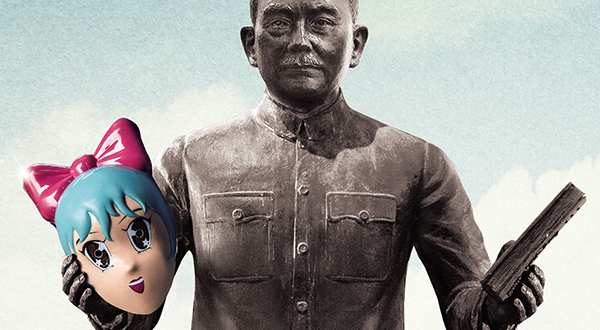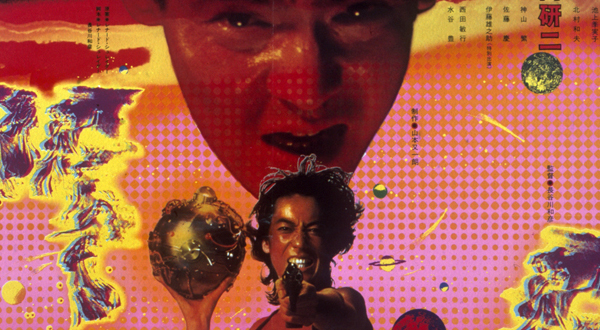So, what’s next? Why, a pair of films that each has sun in their titles…
Meeting Dr. Sun

It’s a coming of age flick. It’s a heist movie. It’s both! Meeting Dr. Sun’s central character is a Taiwanese high school student with a nickname, Lefty (Zhan Huai-yun), as well as money problems. As in, he doesn’t have any to pay the class bully his monthly “class fees”. One day Lefty discovers a statue of Dr. Sun Yat-sen, founder of the Republic of China and a figure that both the Communists (who currently rule China) and the Nationalists (who fled to Taiwan near the end of the Chinese Civil War) revere, collecting dust in a gymnasium storage room. Lefty then concocts a plan to steal the statue, so it can be sold for scrap metal, for him and his three somewhat dimwitted pals to execute. Things are looking great until they stumble upon some other kid’s notebook, containing the same exact idea. Eventually Lefty is able to track down its owner (Wei Han-ting), who has similar reasons for stealing the statue: he too is dirt poor, so both kids engage in a dueling banjos-style stand off to see who is more destitute. In the end, it would seem as if the other kid is indeed the poorest, so instead of sleeping in the streets, Lefty invites him to crash at his group’s HQ where all their gear for the upcoming heist is stored, and even offers the chance to join his gang. Which doesn’t sit too well with the others, and their skepticism ends up being completely justified when it’s discovered that all their tools have been stolen by the other kid and his buddies. Oops.
A new plan is then conceived; once the other kids’s crew has unloaded the statue in the back of their getaway vehicle, Lefty’s posse will simply swoop in and drive off for themselves. But when they discover that this other band of robbers are unable to load the super heavy cargo onto the moving cart, Lefty and his company must lend a hand. Which they don’t realize is even happening because everyone’s wearing the same crappy anime masks (which were only chosen upon because it was the cheapest disguise possible). Yes, they also don’t realize that their numbers have doubled; these kids are that dumb, which is why the movie works so well believe it or not. Meeting Dr. Sun is oozing with commentary, as it relates to modern day Taiwanese politics; for starters, you have a statue representing the revolutionary who inspired many to leave mainland China for Taiwan and whose teaching once represented the key to China’s better tomorrow, locked away in a school closet. Not only that, but these kids are trying to sell the man (and perhaps his ideals) for a few measly dollars (granted, they really need the money); I also read somewhere that the Chinese word for scrap metal sounds a lot like the term for “abandonment of reunification” (and the goal of a unified China has long been the underpinning of most political dogma). But in lieu of bashing the viewer on the noggin with such heavy-duty topics, the film let’s the actions of dopey high schoolers do all the talking, proving that even bold faced stupidity can have nuance.
Instead of reciting eloquent soliloquies that are a bit too movie magic, Lefty and friends behave in manner that’s to be expected when one lives in a society in which you’re told at a very young age that you’re destined to be poor for the rest of your life, so deal with it. Because when the world tells you are a loser, you’re going to act like a loser, even when you’re not. And much like many John Hughes films, Meeting Dr. Sun is all about kids trying to better themselves, despite themselves, with a decent dose of Wes Anderson’s Bottle Rockets-grade antics as a cherry on top. If all that sounds good to you, Meeting Dr. Sun plays Tuesday June 30, at the Walter Reade Theater (get your tickets here).
The Man Who Stole the Sun

The Man Who Stole the Sun is part of NYAFF15’s Last Men In Japanese Film, and aside from being a somewhat lesser known vehicle for Bunta Sugawara, one of the two keys focal points for the aforementioned program, it’s also a cult classic in its homeland that has the potential to become one in America, thanks to the New York Asian Film Festival’s seal of approval (not saying it’s in the same league as Hausu or Miami Connection, but it’s a piece of work nonetheless). Anyhow, the official star of the show is Kenji Sawada who plays Makoto Kido, a high school science teacher with long hair and an affinity for bubble gum, plus sleeping on the job, so his students think he’s cool. He’s also way into atomic bombs, but more on that in sec. Early into the picture, Kido accompanies a bunch of students on a field trip, which is hijacked by a crazy old guy sporting WWII era military fatigues and weaponry. He demands to see the Emperor and once outside the palace, a showdown ensues with the police, led by Sugawara as Inspector Yamashita. It’s immediately apparent that Yamashita is a total bad ass, who is able to subdue the crazy old man in a total bad ass manner. Kido is hailed a hero as well, who also makes a new friend in Yamashita. Not long after this episode, it’s back to life as normal for the too cool for school (and society as a whole) chemist, which is creating a homemade atomic bomb. The sequence in which Kido infiltrates a nuclear plant to steal the most vital ingredient, plutonium, is particularly noteworthy for being a most excellent showcase of the wild, avant garde spirit that had swept up Japanese filmmakers during the 70s (specifically the use of still frames to heighten the action, like we’re looking at panels of a live-action manga, along with the use of sound effects from Space Invaders).
With the bomb complete, Kido starts getting down to business: first he plants a dummy bomb in a government building, containing only a minuscule amount of plutonium, enough to let the authorities know that he is indeed the person behind the nuclear plant break in. Next comes the first real demand: to stop the evening news from interrupting the final innings of televised baseball games. He also insists on only speaking with Yamashita, who kinda recognizes the bomber’s voice, but can’t put his finger on it exactly (mostly due to Kido’s use of a voice modulator). Though the next demand is even more peculiar; Kido… who identifies himself as No. 9, because there are eight superpowers, nations who have access to the bomb, and he’s the ninth… calls in on a live radio show hosted by Zero Sawai (Kimiko Ikegami, best known to American audiences as Gorgeous from Hausu). He proudly announces to all that he has an a-bomb and can have anything in world, yet can’t think of anything, so he asks Zero to poll her audience and see what they’d wish for the most. Naturally, this causes a buzz among Zero’s listeners, though Kido mostly ends up caring what the DJ wants. Which is to have the Rolling Stones perform live in Japan; Zero even mentions how she had tickets from six years prior, before they were banned by the Japanese government (which is true; they were scheduled to play in 73 until officials, not happy with Keith Richards’ arrest for drug possession, cancelled their Budokan dates, as if they were going to sell drugs at their show or something). Kido then calls up Yamashita demanding there to be a Rolling Stones concert within three weeks or the bomb goes boom. And wouldn’t you know, the Stones are indeed coming back to Japan! As such, Zero starts to become infatuated with Nine and even manages to track him down, where they share a kiss. Here we witness the true heights of Kido’s narcissism, along with his genuine disdain for all human beings, as he casually throws her into the ocean after their intimate moment (though during, Zero is able to get herself a nice clump of Nine/Kido’s hair, which is falling out due to radiation).
As expected, Kido’s cockiness eventually leads to sloppiness, plus the cops manage to finally figure out a means of tracing his calls (which had been the one thing that’s tripped them up the most). Kido’s third demand, cold hard cash (to pay back the yakuza the money he borrowed, to help pay for necessary equipment earlier on) goes completely haywire, resulting in his precious bomb falling into the hands of authorities. Thus we witness Kido’s attempt at getting it back, in which he’s aided by Zero, who also broadcasts the escape live for the listening audience. With the resulting car chase echoing Blues Brothers a tad bit, as well as additional reminders of why the NYAFF decided to fashion an entire program around Bunta Sugawara. It just gets more and more ridiculous from there, like all cult classics. The Man Who Stole the Sun tries hard to cover all the bases… comedy, action, romance, political satire… and largely succeeds! It’s often difficult recommending something that’s so off the beaten path, as well as something that’s so long (at close to two hours and thirty minutes, it’s quite the commitment), but for those wanting something different finally have something different. If you feel like giving it a shot, you’ve got it thus Wednesday July 1, at the Walter Reade Theater (get your tickets here).
